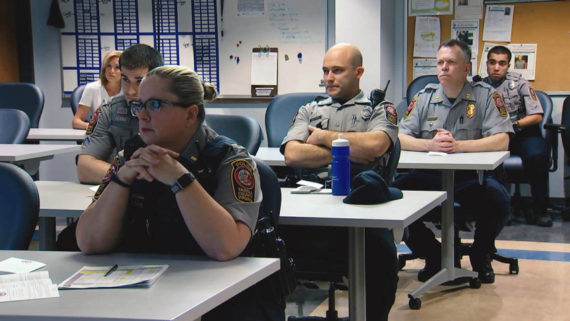
Fairfax County Police roll call. Courtesy NBC 4
(5-4-20) Five years ago, the police department and sheriff’s office in Fairfax County, Virginia, came under fire because of two separate deaths: an alleged coverup of a police shooting outside a home and the death of Natasha McKenna, a woman with mental illness, inside the jail.
Because of the public outcry, the county’s governing body (the Fairfax County Board of Supervisors) created an Ad Hoc Police Practices Review Commission to review what had happened and recommend reforms to reduce future police shootings and inmate deaths. I served on that commission and among its myriad of recommendations in its final report were 24 specifically about mental health.
It’s not uncommon for a blue ribbon panel to publish a report, only to have those recommendations sit on a shelf gathering dust. To insure this didn’t happen, the county periodically listed on its website a progress report.
Unfortunately, the last update posted on the website was on June 2018 – nearly two years ago. That’s not a good sign.
One possible explanation for the lapse is that the two elected officials most responsible for pushing reforms – former Board Supervisor Sharon Bulova and Supervisor John Cook – are no longer in office.
Regardless, the public is entitled to know which of the commission’s recommendations still haven’t been implemented and why.
I’m curious too if your community adopted any of these mental health reforms.
Recommendations implemented by the Fairfax County Police Department
- Establish the Memphis model for CIT training in the police department.
- Create incentives, such as flexible shift hours, to attract police officers to volunteer for CIT.
- Create a uniform pin that identifies CIT trained officers.
- Require that officers seeking advancement into leadership positions complete CIT training.
- Encourage CIT officers to form professional relationships with mental health workers to insure cooperation.
- Empower CIT officers to divert suspects when possible to treatment rather than arrests.
- Develop full range of mental health and disability awareness training at police academy.
Implemented reforms by the Sheriff’s Office.
- Establish a team of full time deputies who’ve undergone mental health training to deal with inmates in crisis.
Recommendations listed as “in progress.” I know that Fairfax did establish a successful Diversion First program but on the county’s progress chart this is listed as “in progress.”
- Require all first responder-emergency personnel to have at least 8 hours of CIT training.
- Expand Mobile Crisis teams.
- Increase the number of mental health clinicians in jail.
- Increase discharge planning for inmates leaving jail so they receive appropriate services.
- Insure jail pharmacists have access to most effective psychotropic medications.
- Implement CIT training for sheriff’s officers.
- Establish CIT assessment locations where officers can take individuals for evaluation rather than emergency rooms or jail.
- Increase mental health services that will help prevent arrests, rather than focusing resources on jail services after arrests.
- Implement federal Stepping Up Initiative campaign.
- Fund and support Diversion First program that diverts candidates from incarceration into treatment
- Collect specific data to establish metrics to see which mental health programs are working and which aren’t.
- Encourage mental health awareness training for judges, magistrates, probation and parole officers.
- Passage of a bill that would allow emergency responders to transport someone directly to a mental health facility and not an emergency room as currently required by state law.
Recommendations “under review” and not yet implemented.
- Increase language and cultural competency so that first responders and mental health workers can better serve non-English speaking justice involved individuals.
- Implement mental health dockets.
Recommendation that was NOT implemented.
- Have CIT officers responding to mental health calls wear plainclothes and use unmarked vehicles to avoid unintentionally escalating a mental health crisis.
Based on the out-of-date progress chart, the police and sheriff’s departments have implemented nearly all of the recommendations. The Fairfax County/Falls Church Community Services Board, which oversees mental health services, was largely responsible for those recommendations still needing to be implemented.



